What the Cherokee Nation found about equal treatment of its citizens of Freedmen descent
During Juneteenth celebrations last week, Cherokee Nation leaders shared the findings of a recent task force focused on identifying service gaps and improving equality for tribal citizens of Freedmen descent.
Here's what the task force reported.
Cherokee citizens of Freedmen descent show little participation in tribal programs
Cherokee Nation Principal Chief Chuck Hoskin Jr. signed an executive order in 2020 based on equal protection and equal opportunity under tribal law, according to a Cherokee Nation press release. The order was later expanded in 2024 to create a task force that would study whether Cherokee citizens of Freedmen descent are provided equal access to tribal programs and services.
“As proud as we are of all of the efforts we have made to ensuring we serve all citizens of the Cherokee Nation, Deputy Chief [Bryan] Warner and I are not afraid to take a critical look at what we do," Hoskin said in the release. "On the issue of Freedmen and equality, we believe firmly that we cannot hope to heal if we close our eyes to the history of slavery, if we close our eyes to the consequences of slavery. We cannot make progress if we are unwilling to examine whether our efforts at healing today are adequate. This task force report gives us some important answers, and some guidance, and challenges us to ask even more questions.”

According to a press release from the Cherokee Nation, the task force found that there are more than 15,600 Cherokee citizens of Freedmen descent living across the country, including nearly 3,000 inside the tribe’s reservation and more than 12,700 living at-large.
Cherokee citizens of Freedmen descent represent about 3.3% of overall tribal citizenship, but some tribal programs see less than 2% of Freedmen participation through programs under the tribe, the task force found. According to the release, many Cherokee citizens of Freedmen descent are unaware of certain programs for which they may qualify.

“With these findings from the Task Force on Equality, Cherokee Nation can better identify the gaps that exist today and make more informed decisions that not only better the experience for Cherokee citizens of Freedmen descent, but the tribe as a whole,” Deputy Chief Warner said. “I’m thankful for the individuals on the task force who took this project to heart and worked hard to have what, at times, may have been difficult discussions. Equality for all Cherokee Nation citizens is a critical part of how we should be serving, and this report will help us do just that.”
The task force recommends tribal departments work to ensure inclusion and outreach to Cherokee citizens of Freedmen descent, according to the release. It also recommends developing initiatives to raise awareness about the history and contributions of Freedmen descendants within the Cherokee Nation.
Cherokee Nation's history of slavery
The Cherokee Nation was the largest holder of chattel slaves among the Five Civilized Tribes, according to the Oklahoma Historical Society. It had 4,600 slaves by 1860, and many tribal members depended on them as a bridge to white society.
When Native Americans were forcefully removed from the Southeast during the 1830s and 1840s, Native Americans from the Five Tribes — the Cherokee, Muscogee (Creek), Choctaw, Chickasaw and Seminole — brought enslaved African Americans along with them on the "Trail of Tears" to Indian Territory, or present-day Oklahoma.
Slavery existed in Indian Territory until the Reconstruction Treaties of 1866 abolished slavery and extended citizenship, including land rights, to the freed slaves.

“The Treaty of 1866 didn’t say ‘some’ of the rights of native Cherokees; it didn’t say, ‘some of the rights, some of the time,’ and most assuredly, the Treaty of 1866 doesn’t say that Cherokee descendants have to beg for their rights at the ballot box," Hoskin said in the release. "That’s a true statement, and we need to say it every chance we get. Equality is the order of the day at the Cherokee Nation. The work toward equality and freedom goes on at the Cherokee Nation. We seek to give deeper and broader meaning to Juneteenth.”
This article originally appeared on Oklahoman: Gaps in equity for Cherokee Nation citizens of Freedmen descent

